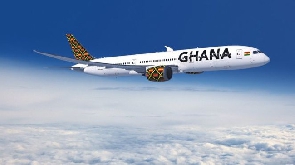 Government has reportedly chosen Ashanti Airlines as its strategic partner for a home-based carrier
Government has reportedly chosen Ashanti Airlines as its strategic partner for a home-based carrier
After several failed attempts to re-establish a new national carrier with Accra as its base, Finance Minister, Ken Ofori-Atta, presenting the 2022 budget to Parliament in November 2021 last year, said the new airline will take to the skies this year.
”As part of Government pursuit to make Ghana the Aviation Hub for the West African Sub-region, the Ministry is at its final stage of negotiations with the selected strategic partner for the establishment of the home-based carrier. It is expected that the negotiation will be finalised and the airline established in 2022,” Mr. Ofori-Atta said.
Contrary to proposals in the budget, AviationGhana’s analysis of past agreements and current state of affairs show that it is improbable for the proposed airline to take to the skies next year as stated.
Presently, a second Committee, which was established this year after the Ministry of Aviation was scrapped and oversight responsibility of aviation placed under the Ministry of Transport, has finished its work on evaluating the EgyptAir deal and has presented its findings and suggestions to the Transport Minister, Kweku Ofori Asiamah.
A key recommendation, gleaned by AviationGhana, is for government to look inward and find the funds required for the project. Other proposed alternatives include partnering an existing local airline or local investors to establish the airline.
A combination of unclear policy direction, contradictory agreements and challenge with funding sources over the last 10 years, makes the enterprise a difficult proposition to get over the line next year.
Unclear policy direction
In 2013, government shortlisted six transactional advisers as part of the process of re-establishing the new airline.
The policy proposition was that ‘Ghana would own no more than 10 percent of the company’. Ghana was also to retain the rights to routes assigned to the operator of the carrier
PwC, which got the nod as transaction advisers, in 2015 presented its interim report on the proposed national carrier to government. There was a firm promise that the airline will launch in March 2015 with the Government of Ghana (GoG) holding only a 10percent carried interest in the new entity.
This, however, changed in 2017–government was willing to hold majority stake in the new entity (51 percent) while the strategic partner controls 49 percent. Government’s 51 percent stake was then to be made available to local investors.
Indecision about a strategic partner
For almost a decade, government has been indecisive on the choice of a strategic partner. A host of world-renowned airlines have all been mooted as partners at one stage or another, only for a change of mind months later.
Qatar Airways, South African Airways, Air Mauritius, Ethiopian Airlines, EgyptAir, Boeing, and Africa World Airlines (AWA) have all been mentioned at one stage or the other.
The recent attempts saw Ghana engage Ethiopian Airlines ostensibly to establish the new home-based carrier with ET as the strategic partner, given the East African-based airline’s experience and technical know-how. Indeed, a Memorandum of Understanding to guide the initial talks and future discussions was signed in Addis Ababa.
Despite the signing of an MoU with Ethiopian Airlines to actualise the vision of a new home-based carrier, the deal was held back due to what government described as a lack of agreement over key issues such as routes, funding, and tenure of the management contract among others. Then enters Boeing.
Ghana signed Letters of Intent on Day 3 of the Dubai Air Show 2019 for the acquisition of the three Boeing 787-9 planes with a list price value of $877.5 million and three Dash8-400s for the start of the country’s new flag carrier.
The financial arrangements for the acquisition of the planes were either a leasing arrangement with a third party funding it and regular payments made by the new carrier or an outright purchase with funding from investors or central government.
While the deal, at the time of signing, was a statement of intent by Ghana that it wants to see its national flag back in the skies, it was good press and show of confidence for Boeing, which was going through difficulties because of issues surrounding the fatal crashes with the 737 Max
However, this proposed partnership with Boeing and D-Havilland remained an ‘intent’ and was not pursued further.
Lack of funds
After an expensive banking sector clean up that cost the in excess of GH¢ 10billion, unplanned expenditure to mitigate the impact of the coronavirus pandemic on those below the poverty line—through absorbing of electricity and water bills for a short period and distribution of cooked and raw food items—central government has no fiscal room to maneuver let alone set aside some US$5-10million to start an airline.
Exim Bank and SSNIT have been mooted in some quarter and meetings held to convince them to fund the project as in the case of EXIM Bank. However, AviationGhana sources say, due to the capital intensive nature of airline operations, the time it takes to break even, and the small margins, these two potential sources are unwilling.
These issues have conspired to make the new home-based carrier project unattractive to many would-be suitors. It remains to be seen what Cabinet will decide next.
Watch the latest episode of BizTech below: